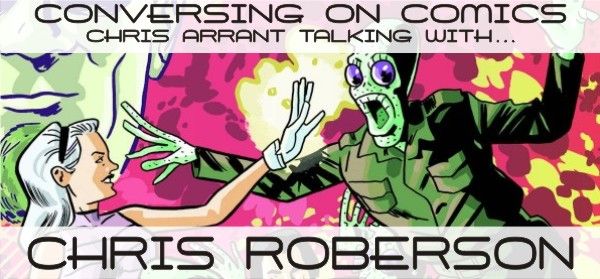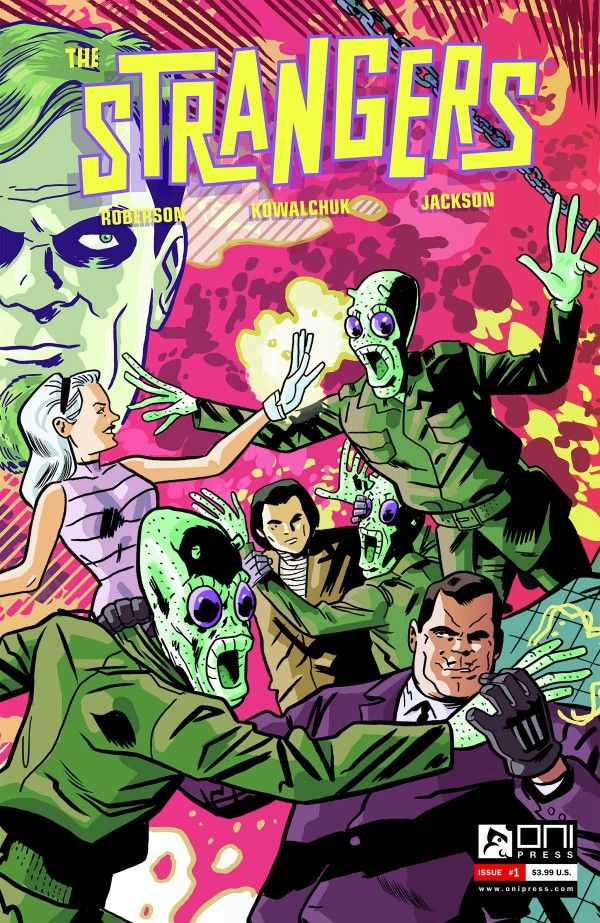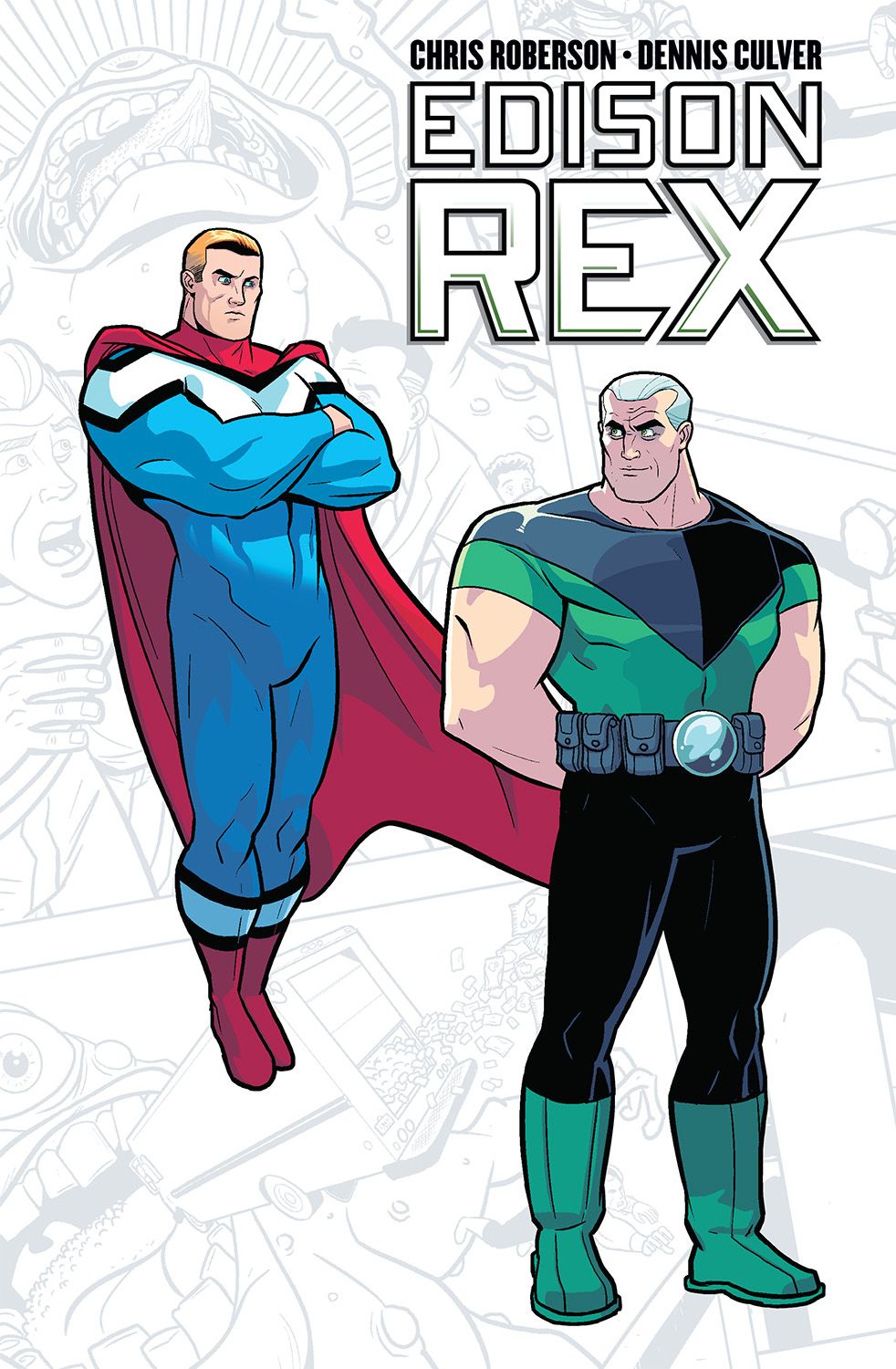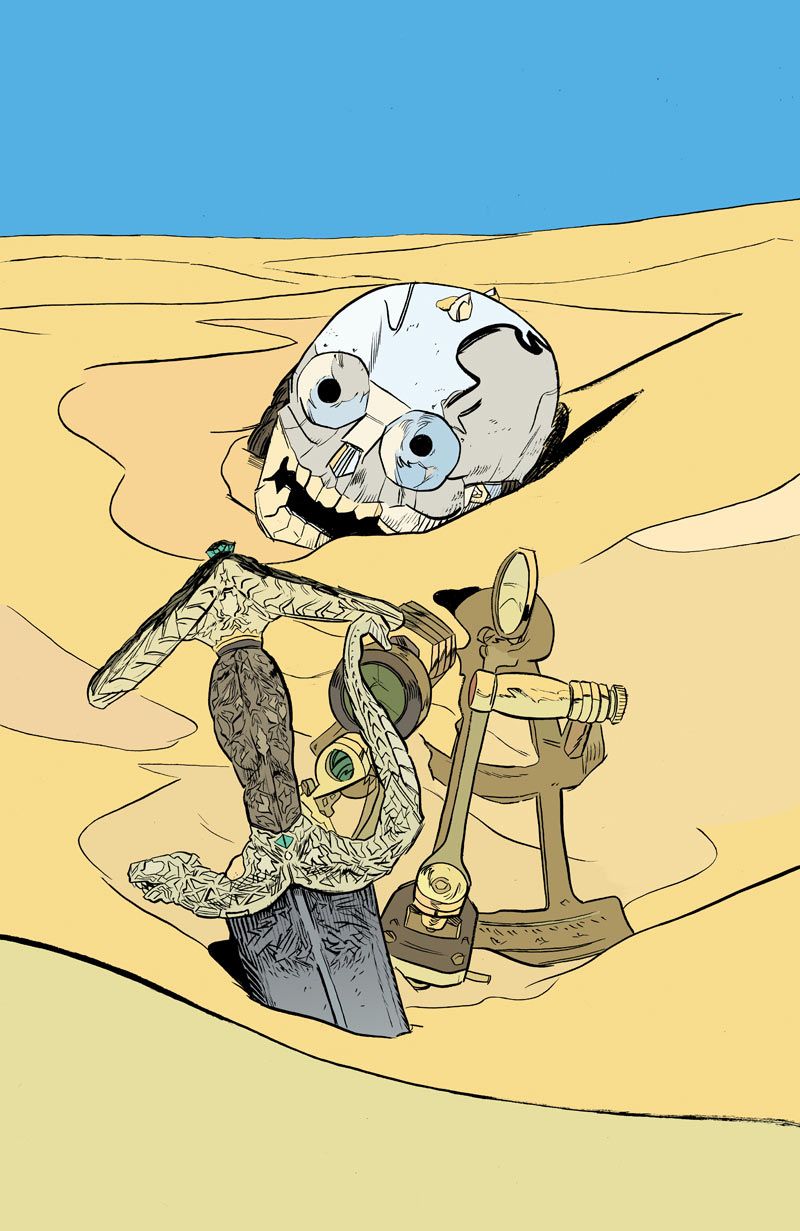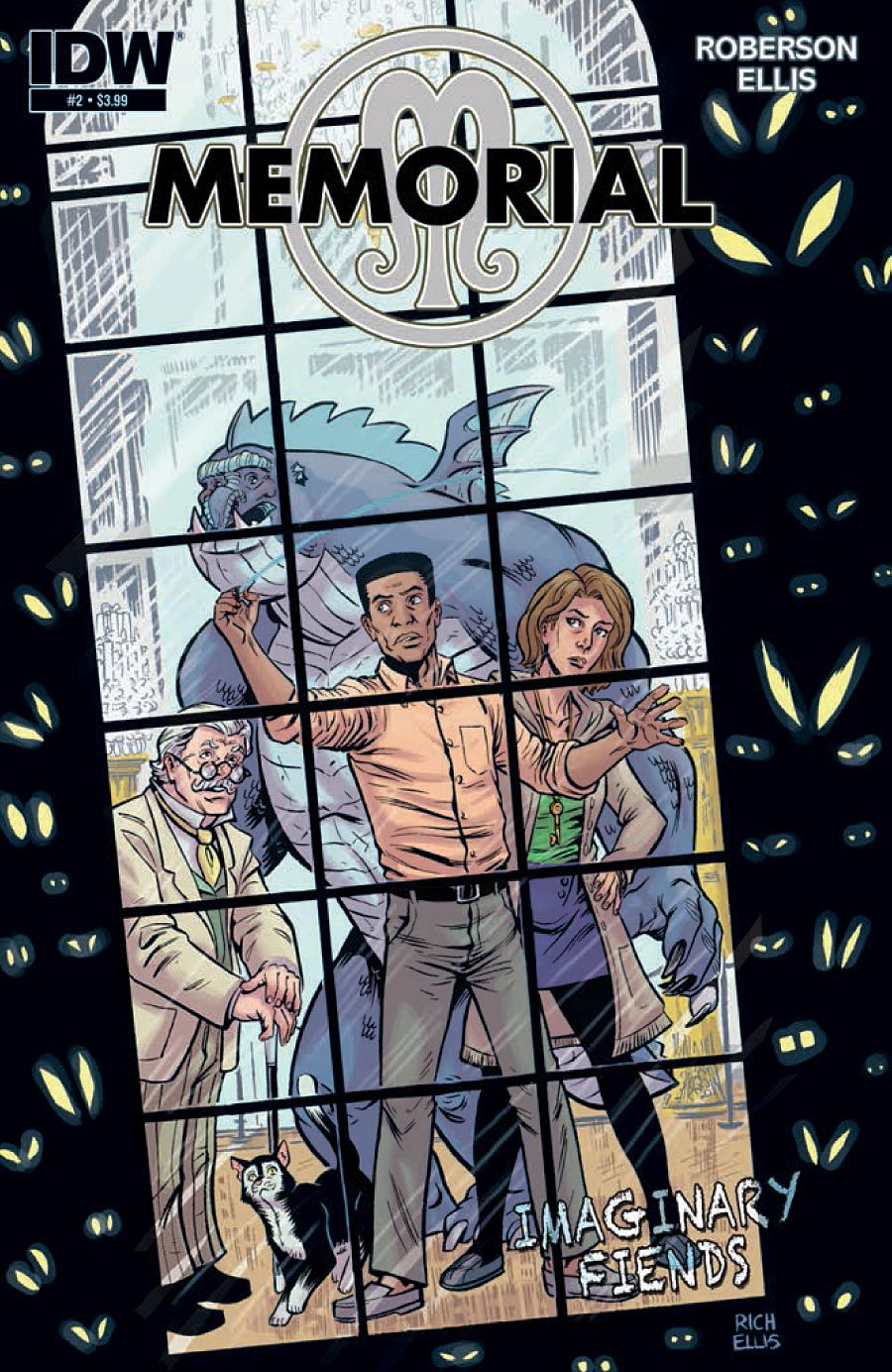Chris Roberson has been thinking what comic writers are supposed to do in comics. While many creators follow the usual trajectory of creator-owned projects to Marvel or DC, the Portland, Oregon-based writer went from the Big Two and found his true calling, making his own comics and helping others to do the same.
A science fiction author, Roberson was ushered into comics as a colleague and co-writer of Fables creator Bill Willingham. However, Roberson quickly branched out, first with the Vertigo series iZombie, and then as the writer of Superman, putting him in the unenviable position of picking up the pieces after J. Michael Straczynski left midway through his much-heralded run. Although he turned in some great work in his short run on Superman/Batman, Roberson ultimately found DC not the kind of place he wanted to continue working.
Leaving the Big Two behind, he jumped headfirst into creator-owned work, setting up Memorial with Rich Ellis at IDW Publishing and then last year re-envisioning his boutique prose company Monkeybrain as a forward-thinking digital comics publisher, with another new series, Edison Rex, leading the charge. Fast-forward just one year, and Monkeybrain's stable of titles earned a handful of Eisner nominations. And Roberson is only getting starting.
Wearing the hats of writer and publisher, Roberson is pushing Monkeybrain into its second year with new titles and new deals for print publication while launching creator-owned series like Reign at Image Comics and The Strangers at Oni Press. Between all of that, we managed to get Roberson to talk to us about his many pursuits and his vision of comics.
Chris Arrant: What are you working on today?
Chris Roberson: Juggling lots of things at once, but that’s pretty typical. Most of the day was spent finishing up the script for the fifth issue of The Strangers, the book that Scott Kowalchuk and I are doing at Oni Press. But we’re also doing “pre-press” on a couple of new Monkeybrain Comics titles, reviewing a super-cool anthology project that asked me for a cover blurb, and other stuff like that.
You’ve been known for some time as a writer, but with the success of Monkeybrain your long career as a publisher is coming to light for comics fans – even more so with Bandette earning four Eisner nominations this month. What’s it like for you to see this project of yours and Allison Baker’s flourish so?
Awesome? Amazing? Incredibly validating?
As you mention, Monkeybrain has been in operation as a publisher for more than a decade, but making the shift to comics was something that Allison and I had talked about doing for AGES. It wasn’t until Allison figured out how to structure things financially and organizationally that we were finally able to get it off the ground, but as optimistic as we were about the idea, we weren’t sure when we launched last summer if we could actually make it fly. But we did, and it is, and we couldn’t be happier about it!
With all the success, what’s been the most trying moment for you so far?
I think the only moments that might be fairly called “trying” were at the first beginning, or rather right before the very beginning. When we launched at San Diego last summer, we knew that we wanted to have a number of titles finished and ready to go at the same time, while also keeping the whole thing under wraps until we were ready to launch. And that produced a fair amount of anxiety, getting all of those ducks in a row without letting anyone know, making sure all of the files were ready and uploaded to comiXology in time for the announcement. And, of course, making sure that they were all as good as they could be. But once we passed that hurdle, everything else has been fairly smooth sailing, just making sure that the comics are the best that they can be and getting them together and out the door.
I think it’s a very interesting time. We’ve seen moments like this before, when one way of doing things gradually gives way to another, and they’re always a time of experimentation. The birth of the Direct Market in the late '70s/early '80s as the newsstand market died a swift death was one, and the changes to the direct market when Diamond became the last distributor standing in the '90s was another.
Ultimately, I think that diversification is going to be an essential part of any future success in American comics. Digital won’t be the magic bullet that changes everything, and I don’t see a time when print comics vanish from the face of the Earth. But more or more it seems that the way forward is to do everything possible and see what works. Some readers are going to always prefer print editions, and so we’ll need to make those available to them. Others will rather have digital serialization, and so we need to offer that, as well.
And for the creators, it’s going to be harder to rely entirely on one source of income. There was a time when creators could make a living working entirely for one publisher, whether doing work-for-hire exclusively or even doing creator-owned projects. But I think that’s proving to be less and less likely. Even on a single project, the money that a creator derives is going to be coming from multiple revenue streams, whether it’s serialization plus digital plus print plus collection, or crowdfunding plus sales, or what-have-you. Those entertainment dollars are still out there, but we’re going to have to work harder and smarter to get them.
Besides being a publisher, you’re really expanding the number of comics you’re writing, from Edison Rex and Memorial to Masks and the upcoming series The Strangers at Oni and Reign at Image. Post-DC this seems like you finally doing more. How’s it feel to be writing so many titles, many of which are your own?
It doesn’t feel much different, to be honest. I write on average a script a week, and I’ve kept that pace pretty much since breaking into comics a few years ago. I only write while my daughter is at school, too, so I’ve got a pretty regimented work schedule. So from my perspective, my workload has remained fairly consistent for the last few years. And I’m tremendously lucky that all of the projects I’m doing, both the franchise stuff and the creator-owned, are all projects that I really, REALLY enjoy doing. I can’t complain!
The original incarnation of Monkeybrain was as a sci-fi prose novel publisher, and Reign sees you returning to those sci-fi roots – albeit at Image. How do you feel about the state of science fiction in comics today?
It’s good, could be better? I think that science fiction and fantasy are arguably healthier in American comics than they’ve been in some time, with the success of things like Saga, Prophet, Multiple Warheads, and if you extend the definitions a bit, even things like Atomic Robo and Sixth Gun. Of course, I think that there could always be more variety and diversity, so I’m always hoping that more cool sci-fi/fantasy comics come along.
Probably for the same reason that mysteries or romance or epic fantasy haven’t done better. Science fiction comics used to be much more common, coincidentally at the same periods in which mysteries and romance and fantasy were more common. But for much of the last few decade, superheroes have dominated the American comics market. Of course, there were lots of superhero comics with science-fictional elements (as well as elements of mystery, romance, etc.). I think what we’re seeing now is those genre boundaries eroding even more than they ever have in the past, for a large number of reasons, and as a result we’re seeing a lot more variety when it comes to the kinds of comics people are making.
An overly simplified answer would involve aphorisms about eggs and baskets, probably. But the reality is that one size doesn’t fit all, I suppose. I was motivated by the same sort of thinking I mentioned before, about trying all sorts of different things and seeing what works. Memorial was a creator-owned project at IDW before Monkeybrain Comics got off the ground, but even after Monkeybrain launched I was delighted to do a second Memorial miniseries with them. (And just as delighted to partner with IDW on the forthcoming Edison Rex trade.) As for Image, I had wanted to work with them on a project for a long time, as I’ve been really impressed with what Eric Stephenson has done during his tenure. He and I discussed the idea for Reign last spring, and it seemed like it might be a good fit for their line.
The Oni project I mentioned earlier, The Strangers, is another creator-owned book, and that came about because I’ve wanted to work with Oni for years. And they had been looking for a project for Scott Kowalchuk, whose work I love, and so Scott and I built the book together from the ground up. In that instance, The Strangers probably wouldn’t exist in the form it’s ultimately taken if the publisher hadn’t suggested that Scott and I collaborate.
You’re best known as a writer, but with the success of Monkeybrain your talents as a publisher is growing. Why do you publish, when you could spend that time writing?
Honestly? Because I love comics, and want there to be more great comics for me to read. And like so many other comics readers, when I finish reading something great I get an almost evangelical urge to go spread the good news about that comic to other people, to get them to read it, too. My role as publisher is really just that same impulse on a slightly larger scale. Monkeybrain Comics is us saying “Here’s this great comic we read, maybe you’d like it, too!”
So would you say you publish comics to fill a gap you see in the publishing of enough great comics, or publicizing them?
A little of both, maybe? I think we can always use more great comics. So simply playing a part in encouraging the creation of great comics is itself something I’m eager to do. But that evangelical tendency is also a part of it, making sure that as many people know about these great comics as possible. By the same token, I’m fairly tireless on Twitter, convention panels, podcasts and elsewhere about talking up the comics I’m enjoying, whether they’re published by Monkeybrain or anyone else. So in my head, it’s really all aspects of the same thing.

